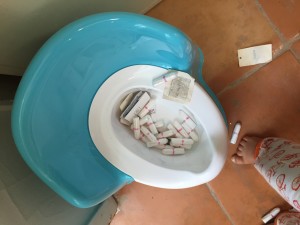Choking Hazards for Littles Ones
It is easy to forget, but choking is one of the leading causes of death for children under age four or five. Many of us are mainly concerned with drowning, but choking is another major potential danger for small children. If you are like me, it is easy to get distracted and not be watching your toddlers every move!
Young children put almost everything in their mouth, which makes the main goal of choking prevention to keep any small items that your child might choke on out of his or her mouth. This means occasionally checking under the kitchen table, behind couch cushions and around furniture. In addition, it is important to regularly check the floor, the car, and other areas where your child crawls, walks, and plays.
Food and Non-Food Choking Hazards:
- Whole grapes
- Peanuts and other nuts
- Popcorn
- Hard candy and chewing gum
- Hard foods, including raw vegetables
- Softer, large chunks of foods, such as large cubes of cheese
- Chewy foods, such as thick spoonful’s of peanut butter
- Uncut hot dogs
- Coins
- Marbles and small balls
- Small magnets
- Balloons
- Safety pins, pen caps, and tacks
- Pet food
- Small toy parts such as: Lego building blocks, dice, beads, etc.
- Small random pieces/parts such as: Earbuds for headphones, buttons, batteries, tampons, etc.
Extra Steps to Prevent Choking:
- Learn CPR.
- Learn Heimlich maneuver.
- Keep medications and vitamins out of reach in childproof containers.
- Childproof cabinets and drawers so that your kids can’t get inside.
- Supervise kids when they are eating.
- Cut foods, like grapes and hot dogs, into small, one-half inch pieces.
- Avoid foods that are not age appropriate for toddlers and preschoolers such as: chewing gum, hard candy, and nuts until they are at least four years old.
- Don’t let your kids play with toys that are not recommended for their age, since they may have small parts and could be a choking hazard.
- Inspect toys to make sure that parts aren’t going to break off and throw out any broken toys.
- Supervise kids under age eight if they are playing with a balloon, keep un-inflated balloons out of reach, and throw away balloons once they deflate or break.
- See your pediatrician if your child seems to have an episode of choking, recovers, but then develops an ongoing cough that doesn’t let up since that can be a sign that your child aspirated the item and it is still in his lung.


Leave a Reply